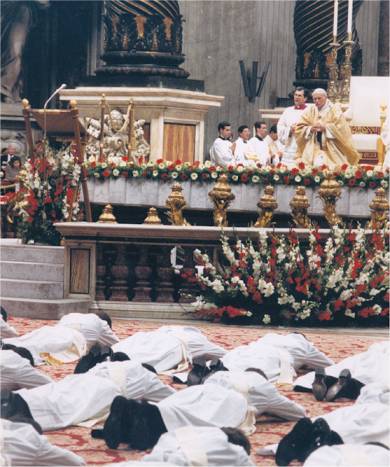No, I am not heading out of the office again!
Rather, a few reflections on yesterday's Gospel lection on the Road to Emmaus.
One of the first aspects of the application process that we have guys go through is to write a 10 to 12 page life history. This is more than just a 'I did this, then I did that, then this happened.' Rather, we look at this as a 'spiritual biography' where we ask the candidate to reflect on his life and how God has been active and involved leading him up to the point that he is applying to the seminary.
As part of this, the potential candidate comes to realize that Jesus has been forming and shaping him for this since the beginning. The call to the seminary and priesthood should not be something that occurs all of a sudden, but has been formed and shaped over time. Surely, the awareness of the call can be rather instant, but yet there is that dawning that 'my heart was burning within while I was walking the journey of my life.' Much like Cleopas and his companion, when our eyes are finally opened and we recognize that Jesus has been walking along with us, there is that desire to get up and to go and share that news with other disciples.
If you are thinking about the priesthood, or know someone who should be thinking about it, I encourage you to pray over this passage and to look back over your life to see how Jesus has been 'walking with you on the way,' preparing you for this moment of response.
Subscribe to:
Post Comments (Atom)










4 comments:
I recently had to do a similar exercise for my seminary application (for a different archdiocese). It was enlightening to say the least. It's very difficult to pick what's important and what's not. I did my best to make it an honest reflection of who I am; I wanted to hit all the formative points.
I had to write a spiritual autobiography for my Master's program, with an "intellectual autobiography" - in other words, a list of books and articles recently read.
Both were written more for the educational focus, as in being prepared for the program itself, as opposed to being disposed to a partical vocational formation. Yet the process is similar, I think.
I'm sure that it is good to have the aspirant to religious life write a history. I have to confess that I have been sceptical of the various Emmaus models. Some of it sure seems like pop psychology.... Emmaus is a metaphor for life.... and we document the places of pilgrimage, or stops, along the journey. The point is that Christ was walking beside us every step of the way, whether we realized it or not. I have done this program myself. It all sounds good, but what happens if the aspirant to the religious life was totally lost in the wilderness for years; or, worse, was apostate? Sure, God was present in her/his life, but do you need all of the sordid details of the journey? Is the real interest in documenting that an individual has always been aware of the real presence of the Lord in their life? Or are you honestly interested in hearing about one's life-journey, whether or not the individual was living as if Christ were right there beside her/himself every step of the way? In other words, do you only accept those who are already well on The Way, or is there room for those who have fallen and squandered their gifts? Sorry for another metaphor, but -- when you throw your diocesan net out, are you casting the net for fish who have always been swimming in the same (i.e. correct) direction, or do you take fish who have been swimming in circles, or completely adrift for a while? How do you determine which fish to keep, and which to throw back overboard? Isn't vocation direction the most awesome responsibility in the entire Church?!?! To know that decisions that you make will impact the entire course of another person's life - and indeed the course of the Church - that is profound business!!!
-- Michael
Michael,
No candidate for orders is a saint, that's for sure. We have all made mistakes and sometimes 'swam in circles' for quite a while. What is important in an exercise like this for those candidates is that they have some sort of awareness of where the went wrong and also an openness to conversion. So when I read a life history that is, umm, 'interesting,' I am usually looking for this awareness.
Post a Comment